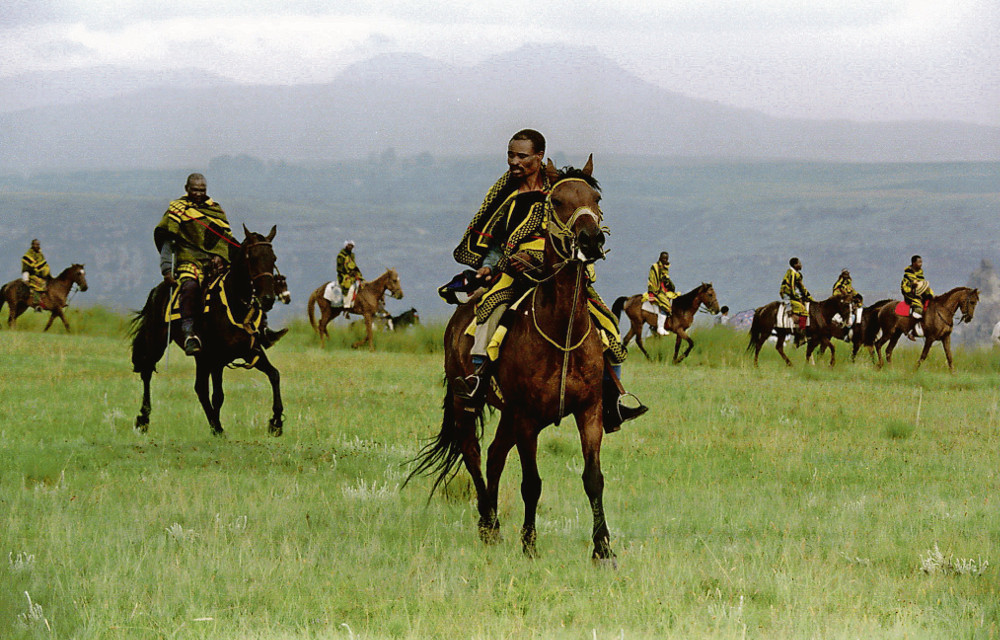Mosheshe was born around 1786 to one
of the Sotho lineages, a minor lineage of the Mokotedi. He was an insignificant
person to his father but became famous as a result of the Mfecane (Difoquone).
His career is much the response to the period of Mfecane when he distinguished
himself by leading down the people at Thaba Bosui (350 ft and a flat of 2 miles
with good pasture on top of the mountain). This was in 1820 when he gained his
reputation, but his outside relation was affected by development other than the
Mfecane.
MOSHESHE’S FOREIGN POLICY
HIS RELATIONS WITH OTHERS:
He provided both safety and food for
all those who came to join him at Thaba Bosui.
Policy towards other Sotho-speaking
peoples: e.g. the
Thokoa, were one of the most powerful chiefdoms at the beginning of the 19th
century in the highveld.
Thokoa just belonged to one of the over 20 chiefdoms led by a lady, Mantatisi who was of equal political wisdom as Mosheshe. She became a threat to Mosheshe chiefdom. The Thokoa led by her were forced to leave their home for 2 years of wondering and lived by plunder principally and so caused untold troubles with communities in the site. To the people of the highveld, they were seen as cruel and unpopular.
They were
rivals to Mosheshe using chiefdom. She led more or less the same as Mosheshe
did - gathering together some of the remnants and other non- Sotha speakers,
providing them with safety and defence. But her reign was temporal and she was
to step down for her son, Sekonyela who took over after achieving maturity at
20. Sekonyela’s policy of domestic control was far less successful than that of
his mother, this was so due to his own personal weaknesses.
Unlike Mosheshe and his mother, he
enjoyed cruelty and war-mongering which alienated him from his own people, this
enhanced, therefore, Mosheshe’s strength of leadership. So Sekonyela regarded
Mosheshe as an obstacle and in 1829 he decided to storm Thaba Bosui while
Mosheshe’s men were away on a cattle raid and took some of his wives (of which
he had 100).
But the intermittent was that
followed on, Mosheshe’s men were much more successful in that he did absorb
many Thokoa people - into his own groups.
MOSHESHE’S POLICY TOWARDS WHITE IMMIGRANTS
His Foreign Policy was not so
successful as he inclined to traditional methods which were inadequate in face
of the whites
The first missionaries arrived in
1830 just exactly when the Griqua were posing a threat to Mosheshe. He became
interested in missionaries and invited them to his court and presented them
with cattle as a token of friendship. The French finally arrived at the “Casals”
e.g. Pans Evangelical society but he wanted to use missionaries as a Bulwark
and kept them at the periphery' (frontiers) as his defence towards his enemies.
HIS RELATIONS WITH THE WHITE FARMING COMMUNITY
Towards 1810 white farmers began
crossing the Orange into the interior. In the initial stages, they were not a
threat but when their number increased they became a real threat and a menace
to the Basuto. For the whites were unwilling to be assimilated into Sotho
Society and also, they were reluctant to stick to specific areas in the country
and wandered all over the place. Their reluctance was compounded by the
difference between Basotho and white farmers' land tenure policy (especially in
the days of the Great Trek).
Mosheshe land policy was to grant
them grazing land on a temporal basis and not permanently on “use tracts”. This
was misinterpreted by white farmers who thought they had been allowed to own
land. This resulted in misunderstanding; for the Basotho, there was no private
land ownership. But the land belonged to the who community under their chief.
Secondly, there was indifference to cattle ownership. The concept for ownership
among Basotho was the “Mafisca” system, under which followers got cattle on
loan to use them and not own them.
The importance of cattle was crucial
in the expansion of the kingdom and cattle raids because of an accepted policy,
the more cattle you had the larger the kingdom. This became a source of
conflicts between Mosheshe and the White farmers. Mosheshe -was unable to stop
his own followers from cattle raids against the whites in the 1850s. His own
internal contradictions in his policy led to wars.











0 Comments